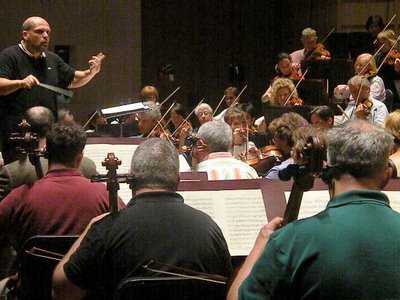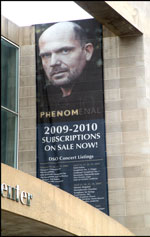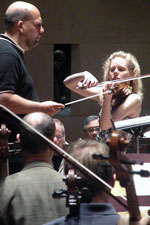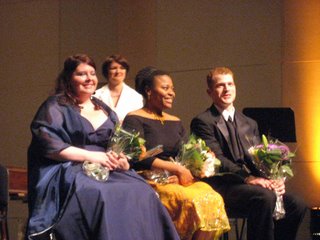Tonight was the first of two evenings of MIMC Chant 2009 Finals. There are eight candidates in total, and tonight we heard four. Having attended everyone of the MIMC vocal competitions since 2002, I think this one is arguably the highest in terms of overall quality of the voices. Just to make it into the final 8 is already a recognition of true excellence. The candidates this evening were ( in order of appearance)
Anthony Roth Costanzo, countertenor (USA) His program was long - aria from
Giulio Cesare, a
Ruckert Lieder, and back to back arias from
Rodelinda. One of the most impressive things about Costanzo's countertenor is the smoothness of his delivery and his seamless registers - the voice is even from top to bottom. When required by the music to dip into what is normally considered chest voice in a man, there is no harshness to his tone or any abrupt change of gear. His sound is as "natural" as any I have heard from a countertenor. His voice is surprisingly large for such a slight person, and there is lots of power in reserve. But his best singing is in the quiet moments. There is a plaintive quality to his sound that is at its best in soft, quiet music, and he chose just the right repertoire to show it off, particularly Mahler's "Ich bin der Welt abhanden gekommen". The tempo chosen by conductor Alain Trudel was a little too slow, even for this famously slow piece. If I were to nitpick, Costanzo was a little reluctant to sing high pianissimi, which is absolutely necessary in the Mahler. Overall, it was a very fine performance of an exceptionally beautiful countertenor voice.
Falko Hoenisch, baritone (Germany) Mr. Hoenisch has a high lyric baritone that is flexible, good in coloratura, and best in lieder. It is a fairly slender instrument as baritone voices go, but he uses it stylishly and with discerning taste. His Hugo Wolf songs were wonderfully sung, and the most successful part of his program. Unfortunately, he ran into some problems with his next piece, an aria from
I Puritani. I have to say Bellini doesn't really suit him stylistically. He lacks the fullness of tone necessary in the
bel canto repertoire. He also ran into some technical difficulties, turning raspy in a couple of places. Perhaps it unnerved him, as by his third aria from Gounod's
Romeo et Juliette, he was holding back and sounded small. The same could be said about "Why do the nations" from
Messiah. The top simply did not bloom. Perhaps he did not pace himself properly, or maybe he simply had an off night, but overall, I felt he sang better in the semi-finals.
Sidney Outlaw, baritone (USA) Mr. Outlaw is also a high baritone. The voice is compact-sized, pleasant and warm in timbre - perhaps not so fantastic in terms of beauty of tone, but the way he uses it is very impressive - this guy is an artist. He communicates the text and the moods of a piece of music exceptionally well - this guy likes drama! Sometimes it can come across as a little stentorian, but his strength of conviction is such that he convinces you, and as we all know, judges look for a singer with something to say to the audience. Technically he is very secure, especially in the high register - top notes hold no terror for him. While he is best in the very dramatic pieces, he also shows that he can sing quietly, as in Fritz's aria from
Die tote Stadt. This aria is a surefire audience favourite and Outlaw sang it beautifully. Overall, his performance was wonderful tonight, and he was rewarded with vociferous applause.
Yannick-Muriel Noah (Canada) Unlike previous years, there is only a single Canadian in the finals this time. Since she has been connected with the Canadian Opera Company in Toronto the last three or so years, I am very familiar with her voice. And what an exceptional instrument it is!
Spinto sopranos don't grow on trees, and Noah is a genuine
lirico-spinto, one that is large, rich, gleaming, with plenty of power in reserve yet capable of delicacy. She opened her program with "Hear Ye, Israel" from
Elijah. She sang this long and demanding aria with gleaming tone. But she has a tendency to suppress her consonants in English - I have to say I had difficulty understanding what she was singing. Her second piece is Jenufa's aria. While it is a rather unusual choice in a competition, her timbre is ideal. The abrupt ending took the audience by surprise - I personally don't think this is a particularly good choice. Her third piece was "Vissi d'arte" from
Tosca. Now, it must be said that Noah covered Tosca at the Canadian Opera last season, and when the Tosca, Hungarian Ezster Sumegi, became indisposed, Noah stepped in and sang two performances that absolutely wowed everyone. The quiet, descending musical line in the opening phrase was very beautifully rendered, and in the two and a half minute aria, she sang it with passion, power and delicacy. She reserved her best for the end - "Ritorna vincitor" from
Aida. Her voice, with it rich, luscious timbre, is ideal. She has all the chiaroscuro one would want. Perhaps a little longer breathline here and there would have been nicer, but overall, it was a magnificent piece of singing.
There you have it - a marvelous evening. For me, the outstanding singers tonight were Sidney Outlaw and Yannick Muriel Noah. I would place both of them in the winners circle, possibly with the countertenor Costanzo a dark horse.
Labels: MIMC, MIMC 2009
 Classical Travels
Classical Travels






